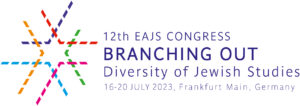Branching Out. Diversity of Jewish Studies
Twelfth EAJS Congress (16-20 July 2023)
Call for Papers
Deadline for Submissions: 23:59 (GMT+1), 31 December 2022 (This deadline will not be extended)
Jewish Studies is – and has been since Leopold Zunz’ Etwas über die rabbinische Literatur – a multi-disciplinary field that brings together scholars, topics and methods from across many academic disciplines. Additionally, Jewish Studies scholars are often involved in multi-disciplinary networks, cooperating and communicating with colleagues from a wide variety of fields. At the same time, research into Jewish history, culture, languages and the like is not limited to Jewish Studies departments, creating yet wider networks and even greater diversity.
The twelfth EAJS congress, “Branching Out. Diversity of Jewish Studies”, taking place in Frankfurt/Main (Germany) on 16-20 July 2023, will showcase the diversity that is an integral part of Jewish Studies: research topics that range from the Bible and ancient history to contemporary Jewish thought and culture, a multitude of different sources from all over the world, methods and approaches from archaeology to digital humanities, and a vast array of interdisciplinary networks and research approaches.
Scholars of Jewish Studies from Europe and beyond are invited to propose papers and sessions. The Call for Papers (http://eajs-2023.eu) contains all formal requirements and a full list of sections and their rationale. Proposals for papers and sessions must be submitted via the congress website.
The maximum duration of a paper is twenty minutes; sessions may include either four speakers or three speakers and a respondent. We expect sessions to honour the title of the congress and reflect the diversity of Jewish Studies scholars by considering the possibilities of gender diversity, and by including scholars from different universities and at least one early career researcher. Sessions that do not reflect diversity will be at a significant disadvantage in the review process.
A special call for papers for “EAJS Emerge”, addressed to PhD students in Jewish Studies, will be published separately. PhD students who wish to present their work within the framework of the regular call for papers need to add a letter of recommendation from their supervisor to their proposal.
Proposals for papers and sessions will be accepted until 23:59 (GMT+1), 31 December 2022. Please note that this deadline will not be extended! All proposals received before this deadline will be reviewed by specialists in the respective field of Jewish Studies. Decisions will be communicated in February 2023. Papers and sessions will be included in the programme only if (all) speakers have registered for the congress and paid their fees by 31 March 2023.
Congress fees:
Paid up EAJS Members: € 80
EAJS Student Members: € 50
Non-Members: € 180
Non-Members (PhD Students): € 80

